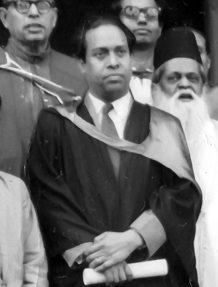Ahmed Sharif
Ahmed Sharif | |
|---|---|
 Sharif in a graduation ceremony | |
| Native name | আহমদ শরীফ |
| Born | 13 February 1921[1] Patiya, Chittagong, Bengal Presidency, British India |
| Died | 24 February 1999 (aged 78) Dhaka, Bangladesh |
| Nationality | Bangladeshi |
| Education | Ph.D. in Bengali literature |
| Alma mater | University of Dhaka |
| Notable awards | full list |
| Relatives | Abdul Karim Sahitya Bisharad (Uncle) |
Ahmed Sharif (13 February 1921 – 24 February 1999) was an educationist, philosopher, critic, writer and scholar of medieval Bengali literature.[2][3] He is recognized as one of the most outspoken atheists and radical thinkers of Bangladesh.[2]
Background
[edit]Sharif was born on 13 February 1921 in Patiya, Chittagong District. His father was Abdul Aziz and his uncle was Abdul Karim Sahitya Bisharad, a prominent historian of Bengali literature. He did his master's and Ph.D. degrees in Bengali literature from the University of Dhaka, in 1944 and 1967 respectively.[2] From 1945 to 1949, he taught at Laksam Nawab Faizunnessa College and later on at Feni College. From July 1949 to 17 December 1950 he worked as programme assistant at the Dhaka station of Radio Pakistan. Finally, on 18 December 1950, he joined as research assistant in the Bengali Department, University of Dhaka and retired as chairman and professor in 1983.[2]
During his time at the University of Dhaka he was elected a member of the Senate, Syndicate, and the president of the Teachers Association and the University Teachers Club. Sharif remained the only person who was elected the dean of the Faculty of Arts for three consecutive terms. After his retirement from the Dhaka University, he was offered to join as first "Kazi Nazrul Islam Professor" at the University of Chittagong, where he served from 1984 to 1986.[2]
He was an active member[2] of the Committee for Civil Liberties and Legal Aid, which was established in March 1974 to protect opposition politicians and members of civil society whose civil liberties were being violated by the Awami League government.[4] He and Lt. Colonel Kazi Nuruzzaman led the Muktijuddha Chetana Bikash Kendra (Centre for the Development of the Spirit of the Liberation War), a group of left-leaning intellectuals who spoke out against the dictatorship of Hussain Muhammad Ershad.[5]
Views
[edit]Sharif taught about medieval Bengali literature and regularly gave insights into the history of Bengal, the Bangladesh Liberation War and Rabindranath Tagore.[3]
Awards
[edit]- Bangla Academy Literary Award (1968)[citation needed]
- Dawood Prize for Literature[citation needed]
- Ekushey Padak (1991)[citation needed]
Death
[edit]Sharif died on 24 February 1999, in Dhaka.[citation needed]
References
[edit]- ^ Haque, Junaidul (27 February 2010). "The iconoclast in Ahmed Sharif". The Daily Star. Retrieved 28 December 2011.
- ^ a b c d e f Kabir, Ahmed. "Sharif, Ahmed". Banglapedia. Bangladesh Asiatic Society. Retrieved 19 January 2015.
- ^ a b Mukhopadhay, Keshob. "An interview with prof. Ahmed sharif". News from Bangladesh. Daily News Monitoring Service. Archived from the original on 4 February 2015. Retrieved 14 January 2015.
- ^ Ahmed, Moudud (2015) [First published 1983]. Bangladesh, Era of Sheikh Mujibur Rahman. Dhaka: University Press. p. 222. ISBN 978-984-506-226-8.
- ^ Hashmi, Taj I. (2004). "Islamic Resurgence in Bangladesh: Genesis, Dynamics and Implications". In Limaye, Satu P.; Wirsing, Robert G.; Malik, Mohan (eds.). Religious Radicalism and Security in South Asia. Honolulu: Asia-Pacific Center for Security Studies. p. 51. ISBN 0-9719416-6-1.
| International | |
|---|---|
| National | |
| Academics | |
| Other | |
Text is available under the CC BY-SA 4.0 license; additional terms may apply.
Images, videos and audio are available under their respective licenses.
